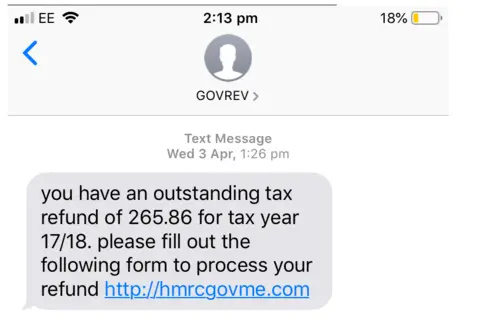HMRC: Beware of tax rebate text message scams
 Getty Images
Getty ImagesEarlier this month John, who believed he was due a tax refund, received a text message from "InfoHM".
"I was bleary-eyed from waking up early," he says. "The excitement of what my tax refund would be overwhelmed my normally pretty rational brain."
He followed online instructions, and unwittingly provided personal and bank account details to online fraudsters.
HM Revenue and Customs (HMRC) is now warning young adults to be wary of such phone scams.
In April and May, the government body says, fraudsters target vulnerable people with fake messages to coincide with the time legitimate rebates are being processed.
Because younger adults typically manage their finances via their mobile phones, they can be particularly susceptible to an approach via text message, HMRC warns.
Last Spring, HMRC received 250,000 reports of such scams.
John, who did not want the BBC to use his real name, says he is now "cringing" over falling for it. But he says the page he was directed to was "the spitting image" of a gov.uk site. After entering his national insurance number and date of birth, it informed him he was due a credible sounding rebate of £462.
He ended up providing details including his bank details and even his mother's maiden name.
 HMRC
HMRC"I didn't even think twice about giving out this information to this website," he says.
"They just have to catch you off guard. If I'd have got the text yesterday at 11:30am after a good night's sleep, I'd have been like: 'This is clearly a scam'."
'I know I'm an idiot'
John reported the breach to HMRC and Action Fraud, and has since put in place extra online security on his accounts.
"You don't need to tell me I'm an idiot," he says. "I know I'm an idiot, this is one of the most idiotic things I've ever done."
The HMRC says it never requests bank details by text or phone, and that it is shutting down hundreds of sites a week associated with these schemes, which are known as "phishing scams".
"We are determined to protect honest people from these fraudsters who will stop at nothing to make their phishing scams appear legitimate," says head of customer services at HMRC, Angela MacDonald.
"If you receive one of these emails or texts, don't respond and report it to HMRC so that more online criminals are stopped in their tracks."
Scammers also use phone calls, voicemails and emails, which may contain computer viruses designed to copy personal or financial information.
